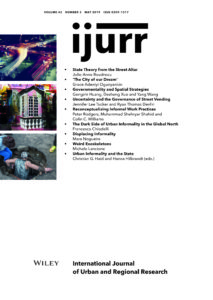Recent attention to the phenomenon of ‘beds in sheds’—outbuildings used illegally for residential accommodation—suggests that shelter informality is increasing in the UK. Reflecting concerns about its apparent proliferation, the issue has been increasingly prominent on government and media agendas, framed in terms of illegal immigration and rogue landlordism, with policy announcements accompanied by high‐profile police and border agency raids. While little firm evidence exists on the scale, nature and causes of this type of informal shelter provision, this paper takes as its starting point the discursive construction of informality in the specific context of the UK, exploring the role of key agentic and structural factors therein. It suggests that an emphasis on agency in government and media accounts may risk obscuring the structural factors (including state policies) involved in the production of informality, as well as the interaction between agency and structure. The case of shed housing demonstrates how informality is produced by a complex interplay of structural and agentic factors characteristic of many global Northern cities, captured by the notion of ‘informality as practice’ which derives from debates focusing on Southern cities. At the same time, it shows how discourses around informality may be mobilized in the service of specifically context‐driven ideological agendas, in this case relating to immigration and welfare.

